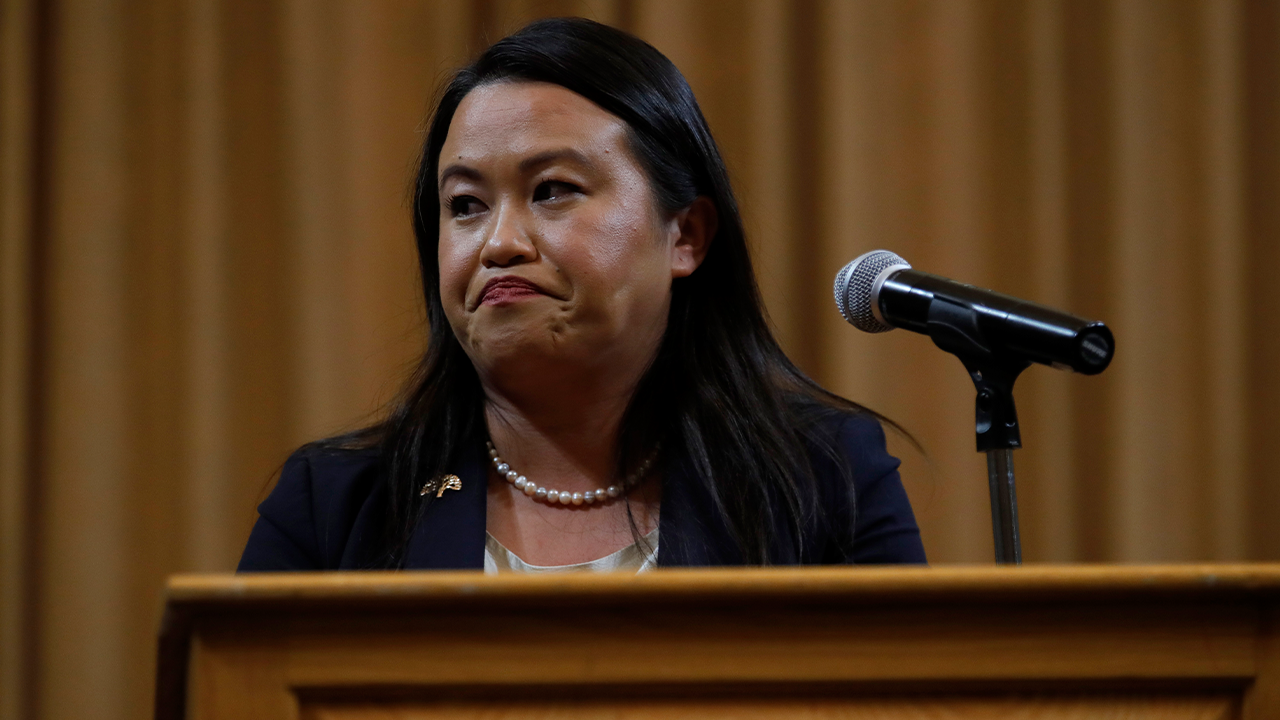New Hampshire
Rivalry deepens, Trump and DeSants hold dueling campaign events in New Hampshire

HOLLIS, NH – The rivalry between Florida Gov. Ron DeSantis and former President Donald Trump deepened Tuesday as the two leading Republican White House candidates mocked each other during dueling events in the critical early voting state of New Hampshire.
Addressing a town hall in Hollis, DeSantis vowed to “actually” build the U.S.-Mexico border wall that Trump tried but failed to complete as president. He also pledged to tear down Washington’s traditional power centers in ways that Trump fell short.
Speaking later at a Republican women’s luncheon in Concord, Trump countered that DeSantis was being forced to settle for second place in the primary and accused the governor of supporting cuts to Social Security, Medicare and other entitlement programs as a way to tame federal spending.
Beyond the rhetoric, the conflicting events demonstrated each candidate’s evolving strategy. DeSantis took extensive audience questions – a trademark in New Hampshire politics that he eschewed during his previous visit to the state, drawing criticisms that he was stilted and overly scripted.
Trump, meanwhile, offered a free-wheeling speech for more than hour. He didn’t take questions in Concord, and reporters covering the event were confined to a pen, chaperoned to the bathroom and told they could not speak to attendees in the conference center ballroom or even in the hallways. But the former president answered questions at a subsequent stop in Manchester, where he opened his New Hampshire campaign office.
DeSantis, asked about people who had twice voted for Trump because of his promises to “drain the swamp” in Washington, used his answer to draw some of his sharpest contrasts yet with the former president.
“He didn’t drain it. It’s worse today than it’s ever been,” DeSantis said. He added that such promises don’t go far enough because a subsequent president “can just refill it.”
“I want to break the swamp,” DeSantis said, pledging to take power out of Washington by instructing Cabinet agencies to halve the number of employees there.
DeSantis has tried to gain ground on Trump by questioning the former president’s continued hold on the national Republican party. At his town hall, the governor slammed the GOP’s “culture of losing” under Trump and mentioned the “massive red wave” that many in the GOP predicted but that never materialized nationally in last year’s midterm elections.
“We had a red wave in Florida,” DeSantis said, noting he easily won reelection last fall. “But that’s because we delivered results in Florida.”
Many leading Republicans remain fiercely loyal to Trump, but there is some evidence that the attacks against the former president are resonating. Speaking about Trump on Tuesday, House Speaker Kevin McCarthy, a California Republican, said, “Can he win that election? Yeah, he can win that election.”
“The question is, is he the strongest to win the election?” McCarthy continued on CNBC’s “Squawk Box.” “I don’t know that answer.” He clarified later in the day to the conservative news outlet Breitbart that Trump “is stronger today than he was in 2016.”
In his own speech, Trump noted that polls show him with large primary leads. He seized on DeSantis saying that, while Social Security and other programs need to be guaranteed for older adults, there may be work “in a bipartisan way to figure out how do you strengthen this” when it comes to younger people.
“You can bet he’ll be doing it later,” Trump said of cuts to the programs. “And he’ll be doing it to you.”
Trump also vowed to “drain the swamp once and for all” but used the slogan more to criticize President Joe Biden than the Florida governor.
“You can’t drain the swamp if you’re part of the swamp, and Joe Biden and other opponents, many of them, are all owned, controlled, bought and paid for, 100%,” Trump said.
The former president also largely echoed DeSantis’ sentiments in promising that “this election will be the end of the world for the corrupt political class in our nation’s capital.”
DeSantis was also asked about the pro-Trump mob that overran the U.S. Capitol in January 2021, and responded, “If it’s about relitigating things that happened two or three years ago, we’re going to lose.”
“I had nothing to do with what happened that day. Obviously, I didn’t enjoy seeing it,” DeSantis said. “But we’ve got to go forward on this stuff. We cannot be looking backwards.”
That, too, clashed with Trump, who repeated baseless claims Tuesday that he was denied a second term by election fraud. Numerous federal and local officials, a long list of courts, top former campaign staffers and even Trump’s own attorney general have all said there is no evidence of the fraud he alleges.
The candidates’ simultaneous visits highlighted the role that New Hampshire, the first-in-the-nation GOP primary state, will play in deciding the next Republican presidential nominee. Much of the focus of the early primary has been on Iowa and South Carolina, where evangelical Christians are dominant.
Spending time in New Hampshire, by contrast, gives the candidates were testing their messages in front of a more libertarian-leaning electorate.
Trump’s first-place finish in New Hampshire’s 2016 Republican primary, after losing Iowa to Texas Sen. Ted Cruz, helped propel him to party dominance. But his Democratic rivals won the state in the 2016 and 2020 general elections.
Before his speech Tuesday, Trump announced that his New Hampshire team features 150-plus dedicated activists and organizers throughout the state’s 10 counties.
Sabrina Antle, from the town of Henniker, said she couldn’t afford to attend the Concord lunch. She and her 9-year-old daughter tried to see the former president later in Manchester, but that event reached capacity before they got in.
“I’m a Trumper but I wouldn’t be upset with Ron DeSantis because I think he’d do a stand up job,” Antle said. “I just don’t know if he has the attitude Trump has, just the assertiveness.”
DeSantis’ campaign angered some members of the New Hampshire Federation of Republican Women by scheduling his town hall around the same time Trump was addressing the group’s luncheon. It called DeSantis’ event “an attempt to steal focus from” its lunch, noting that other presidential candidates scheduled around it.
That didn’t stop DeSantis, who at the town hall talked up the new immigration policy proposal he released Monday in South Texas – betting that the issue can energize GOP voters, even those who are 2,000 miles north of the U.S.-Mexico border.
“We’re actually going to build the wall,” DeSantis said of Trump’s failed pledges to do so. “A lot of politicians chirp. They make grandiose promises and then fail to deliver the actual results. The time for excuses is over. Now is the time to deliver results and finally get the job done.”
But the Florida governor also tailored his Tuesday message to New Hampshire, noting how tougher border security could eventually help limit the ravages of opioid addiction, which have hit the state particularly hard, even as deaths from overdoses have climbed all over the country.
He promised the “most assertive” policy against drug cartels “any administration has ever had.”
“We have to do it,” DeSantis said “because it will save lives.”

New Hampshire
Pushback on adopting new building energy codes in NH highlights climate, affordability tensions

New Hampshire is poised to update its building codes, the laws meant to keep homes and commercial buildings safe and comfortable.
But in the bill approaching Gov. Chris Sununu’s desk, the code that regulates the energy efficiency of new homes is set to stay at the 2018 version.
The energy conservation code has been the subject of a long-running debate in New Hampshire, intersecting with some of the state’s thorniest issues: the affordability of homes, the livability of our climate, and the cost of living.
Proponents of adopting the 2021 energy conservation code highlight that more efficient homes would help people reduce energy use, lowering monthly bills and reducing the climate-warming pollution that homes produce.
Federal agencies that insure mortgages adopted the codes after making the assessment that they won’t impact the affordability and availability of the housing they cover. Some studies have shown that households save money in more energy efficient homes, though updates do have an increased upfront cost.
The codes have faced strong opposition, particularly from New Hampshire’s chapter of the Home Builders Association. In keeping with years of work pushing back on energy efficiency efforts, that group has come out in force against the 2021 codes across the country.
In New Hampshire, the Home Builders Association has testified to lawmakers that the 2021 codes would raise the cost of building homes too much, arguing they would make new homes unaffordable. The numbers they cite, from a survey of a handful of builders in the state, are about five times higher than federal estimates of the cost of upgrades.
All told, the 2021 codes would make homes almost 10% more efficient than the previous codes from 2018. The past two model codes adopted by the International Code Council barely made efficiency improvements for residential buildings.
What the 2021 codes would do
The 2021 codes require efficiency improvements like more insulation and expanded testing for how much air leaks out of a building.
It could also improve the barriers that keep moisture out during the summer and in during the winter, said Paul Bemis, president of the state’s chapter of the American Society of Heating, Refrigerating and Air-Conditioning Engineers.
“An environment like New Hampshire varies quite dramatically,” he said. “Having a proper vapor barrier is key to indoor and human health.”
Lighting systems and their controls face new requirements, too.
Bemis is a proponent of the 2021 energy codes. He says the updates there are important to improving the indoor environment, since people spend 90% of their time indoors.
Federal officials have said the codes could help lower asthma rates and respiratory symptoms.
More efficient buildings also put less strain on the energy grid and draw less power from fossil fuels.
Buildings are responsible for about 40% of energy use in the United States, and account for around 35% of the carbon dioxide emissions that fuel warmer and wetter conditions in New Hampshire.
The 2021 codes, if implemented in New Hampshire, would reduce carbon dioxide emissions by nearly 660,000 metric tons over 30 years, according to a reportfrom the Pacific Northwest National Laboratory prepared for the U.S. Department of Energy.
That’s the equivalent of taking about 157,000 cars off the road, or almost as much of an emissions reduction as closing two gas-fired power plants.
“Climate change is upon us. We need to do something to try to reduce carbon emissions into the atmosphere in the building sector,” Bemis said. “It’s a big task. It’s going to take many years to do it. But we need to start somewhere.”
The cost of the codes
When it comes to cost, there’s agreement on one thing: making homes more energy efficient costs money.
The Pacific Northwest National Laboratory’s study estimates the increase in the cost to build a home to the 2021 energy conservation code instead of the 2015 energy conservation code is around $4,000 for a single family home in New Hampshire. (New Hampshire currently uses the 2018 version of the code).
For multi-family apartment or condo buildings, the increased cost of construction would be between about $1,200 and $1,700 per unit.
The cost varies based on the design of the building and the part of the state it is in, with communities in colder areas facing higher costs.
The study says the average person in the state would pay about $400 more in down payments and other up-front costs and would have an annual mortgage increase of about $140.
Compared to the 2015 energy conservation code, the 2021 code would save a homeowner a bit more than $500 a year on energy bills, according to the study, leading to positive savings by the second year of homeownership.
But in testimony in front of state lawmakers, Matt Mayberry, the head of the New Hampshire Home Builders Association, estimated the upfront costs of building a home to the 2021 standards would be much higher, around $20,000.
“Housing is the number one issue facing the state of New Hampshire,” Mayberry said. “Everyone is touched by this. By staying with the 2018 energy codes, that produces energy efficient homes at affordable prices that people can maintain and can afford to stay in.”
Mayberry said he came to the $20,000 estimate by asking six home builders in the state how much they thought the new codes would cost to implement.
“You’re weaponizing these codes for societal agendas and political agendas, and that’s wrong,” he said. “We think you can decide the home you want to live in.”
Home builders would build homes to more energy efficient standards if customers want them, Mayberry said. But, he said, the association believes that should be up to individuals.
New Hampshire’s consumer advocate, Don Kreis, has expressed his support for the codes and their ability to save people money. In a column on his website, he notes the Home Builders Association supported a law that reinstated energy efficiency programs through the state’s utilities in 2022.
“New Hampshire’s home builders – or, at least, their trade association – are perfectly happy to champion energy efficiency (and make some money installing energy efficiency measures) when the costs are buried in people’s utility bills,” Kreis wrote. “They grow less enthusiastic when they have to reflect those costs directly in the prices they charge buyers of new homes.”
Ripple effects
Many of New Hampshire’s multi-family affordable housing buildings are already built to higher energy efficiency standards than the 2021 codes, said Ron Dapice, the head of New Hampshire Housing.
That organization helps first-time homebuyers with financing and works with developers to create affordable apartment buildings. Dapice hasn’t taken a position on what codes New Hampshire should adopt. But, he said, the state’s minimum standards don’t necessarily affect what kinds of affordable housing is being built.
“Most of these properties already exceed code requirements. Most of them are built to Energy Star standards. And the owners and contractors, I think, see the value long-term for affordable housing and keeping their operating costs as low as possible,” he said.
Dapice said the upfront cost of building more efficient buildings wouldn’t be borne by lower-income renters. Property managers set rents based on income, and Dapice said construction costs wouldn’t raise the gross rent – rent plus utilities – for folks living in those buildings. Landlords might pay for the utilities themselves, and raise the base rent instead.
If New Hampshire does not adopt the 2021 codes, the state will have different minimum standards than those adopted by the Department of Housing and Urban Development, the Department of Agriculture and the Veterans Administration.
The largest portion of homes affected by this change is likely to be those insured by the Federal Housing Administration. But the standards only apply to new construction, and Dapice said new construction homes are less likely to be purchased using FHA or USDA backed loans.
“It may not be an everyday occurrence if that type of buyer would be shut out of their financing options,” he said.
But if Fannie Mae and Freddie Mac were to adopt the 2021 codes, homeowners using conventional loans would also be subject to the new requirements.
“Then I think you could have a situation where buyers are, they want just a conventional loan and they can’t get it because their house isn’t built to the newest energy code,” Dapice said.
The Federal Housing Finance Agency, which oversees Fannie Mae and Freddie Mac, says they are considering ways to support more energy efficiency and have been conducting outreach.
That agency has come under pressure from New Hampshire Sen. Jeanne Shaheen to adopt the 2021 energy conservation code. In a letter earlier this year, she said those standards would improve health, reduce wasted energy and lower costs.
“Energy efficiency is the cheapest, fastest way to deal with our energy needs,” Shaheen said in an interview earlier this year. “If we’re going to address our long term energy needs, thinking about how we make those buildings more efficient is really important.”
New Hampshire
Seacoast Woman Arrested On 4th DUI Charge: Concord Police Log

CONCORD, NH — Lauren Abigail Dennett, born 2002, of Franklin, MA, was arrested at 7:55 p.m. on June 22 on simple assault, domestic violence-simple assault, obstruct report of a crime-injury and domestic violence-obstruct report of a crime-injury charges. She was arrested after an incident or investigation at Grappone Park on Liberty Street.
Jill E. Severance, born 1983, of Concord was arrested at 6 a.m. on June 18 on a bench warrant after an incident or investigation at the Holiday Inn at 172 N. Main St.
Bradley C. Reid, 29, of Concord was arrested at 9:41 p.m. on June 14 on a resisting arrest or detention charge after an incident or investigation on Fisherville Road. He has an active felony acts prohibited charge after being arrested in November 2023, after an investigation or incident at the abandoned Santander Bank on North State Street.
Anne-Marie Ruggles, 51, of Concord was arrested at 7:24 a.m. on June 1 on a warrant after an incident or investigation at the Mobil Kwik Stop at 81 S. Main St. Back in January 2021, she pleaded guilty to a felony subsequent drug possession charge out of Belmont and received a two-to-four-year sentence, suspended for three years with three years probation, as well as a $620 fine. A month later, the sentence was amended — the sentence was completely suspended and she was given credit for 55 days time served. A year later, she was accused of violation of probation and pleaded guilty to the charge in January 2023. She received a 12-month suspended sentence, a year probation, with 57 days of time served credit. Ruggles was accused of violating her probation again and a warrant was issued for her arrest on May 31. She was held on $1,000 cash bail. A probation violation hearing is scheduled for Aug. 15.
Garrett Rogenski, born 1994, of Concord was arrested at 3:45 p.m. on May 25 on two simple assault charges and a possession of alcoholic beverages-public property violation after an incident or investigationon Triangle Park Drive.
William Leroy Vinal, 55, of Concord received a summons at 6:30 p.m. on May 24 on a criminal mischief charge after an incident or investigation on North State Street.
Jonathan Ruharuka, 22, of Concord was arrested at 6:28 p.m. on May 23 on two simple assault and two criminal mischief charges after an incident or investigation at Regency Hill Estates at 12 East Side Drive. Back in September 2022, Ruharuka pleaded guilty to criminal mischief, driving under the influence, conduct after an accident, and driving after revocation or suspension, escaping felony burglary and receiving stolen property charges as part of the plea deal. He received several suspended sentences, $1,240 in fines, and was given credit for 245 days of time served. Since that plea, he has been arrested at least nine times in Concord. In May 2023, documents from a prior criminal case as well as his immigration paperwork were requested. A month later, he was accused of violating probation. After motions to continue and canceled hearings, Ruharuka has a plea and sentencing hearing slated for Aug. 28 on the violation of probation charge.
Maddison Faith Corey, born 2005, of Epsom was arrested at 3:49 p.m. on May 20 on simple assault, domestic violence-simple assault, criminal trespass, and criminal mischief charges. She was arrested after an investigation or incident on Highland Street.
Jennifer De Lellis Voege, 62, of Barrington was arrested at 4:15 p.m. on April 23 on a driving under the influence-fourth offense charge and an open container violation. She was arrested after an incident or investigation on Allison Street. Voege was arraigned on June 11 and is due back in superior court on July 30 for a dispositional conference hearing.
Do you have a news tip? Please email it to tony.schinella@patch.com. View videos on Tony Schinella’s YouTube.com channel or Rumble.com channel. Follow the NH politics Twitter account @NHPatchPolitics for all our campaign coverage.
New Hampshire
Bob’s Stores is closing all New England locations. What it means in New Hampshire
Bob’s Stores is closing all of its store locations, including one in Hampshire.
The discount retailer announced it’s closing all of its locations throughout Connecticut, Massachusetts, New Hampshire, New Jersey, New York and Rhode Island. The only New Hampshire location is located at 1400 Oaklawn Ave. in Cranston.
Bob’s Stores President Dave Barton said the company’s financial struggles led to the liquidation of their physical stores.
“Bob’s has been a stalwart of our local communities for nearly 70 years, and we know our customers remember us as having been there for major moments in their lives,” Barton said. “We remain grateful to our vendors, suppliers, customers and employees for all of their support over the years.”
Bob’s Stores’ going out of business sale
Bob’s locations started Going Out of Business sales in stores on Friday, June 28, with discounts of ranging 30% to 70% off, according to a press release.
Items like workwear, footwear, team wear and casual clothing will be severely discounted. Certain furniture and equipment products will also be on sale.
Can you use Bob’s Store gift cards?
Store credit and Bob’s Stores gift cards will be usable up until the stores’ last day open. No returns will be accepted at store locations.
Store business will officially be closed to the public after July 14, 2024.
Is Bob’s Discount Furniture closing too?
Bob’s Discount Furnituren, which has several New Hampshire locations, is not impacted. While the name is similar the two stores are owned by different companies. Bob’s Discount Furniture is owned by Bain’s Capital, while Bob’s Stores is a subsidiary of GoDigital Media Group.
Who founded Bob’s Stores?
Bob Lapidus founded Bob’s Stores when he opened his first “Bob’s Surplus” back in 1954. He died in 2007, at the age of 78.
Rin Velasco is a trending reporter. She can be reached at rvelasco@gannett.com.
-

 Politics1 week ago
Politics1 week agoBiden official says past social media posts don’t reflect ‘current views,’ vows to support admin ‘agenda’
-

 World1 week ago
World1 week agoIsrael accepts bilateral meeting with EU, but with conditions
-

 Politics1 week ago
Politics1 week agoSupreme Court to review Tennessee ban of puberty blockers, transgender surgery for minors
-

 News1 week ago
News1 week agoSupreme Court to decide whether states can restrict gender-affirming care for minors | CNN Politics
-
/cdn.vox-cdn.com/uploads/chorus_asset/file/25500699/DSCF7644.jpg)
/cdn.vox-cdn.com/uploads/chorus_asset/file/25500699/DSCF7644.jpg) Technology1 week ago
Technology1 week agoHow Apple is trying to make Final Cut Pro a “touch-first” video editing app
-

 World1 week ago
World1 week agoFar-right politician back in German court over use of Nazi slogan
-

 Politics1 week ago
Politics1 week agoOakland mayor breaks silence after FBI raid: ‘I have done nothing wrong’
-

 News1 week ago
News1 week agoWhere Joe Biden and Donald Trump Stand on the Issues



















